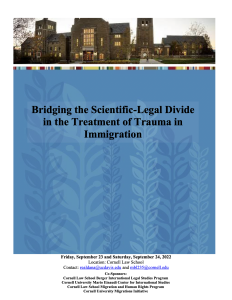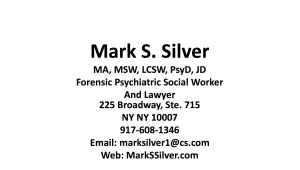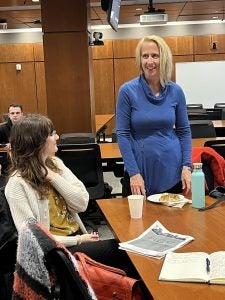
On September 23-24, 2022 at the Cornell Law School, distinguished scholar-practitioners of medicine, psychiatry, psychology, and law, came together to discuss their work improving our understanding of how we document, adjudicate and treat migrant trauma as part of immigration proceedings.
Conference Presentations
Bridging the Scientific-Legal Divide in the Treatment of Trauma in Immigration
New – January 25, 2023 – Read the Conference Notes
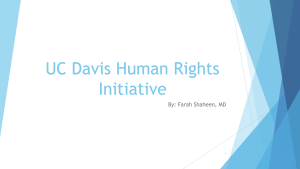 The UC Davis Human Rights Initiative
The UC Davis Human Rights Initiative
Farah Shaheen, Assistant Clinical Professor and Primary Care Internist; University of California, Davis
The UC Davis Human Rights Initiative (HRI) provides forensic documentation of the physical and psychological manifestations of torture and ill-treatment experienced by individuals applying for asylum in the United States. This is accomplished through a collaboration with local immigration lawyers. Dr. Shaheen will describe her and her colleagues’ work with the creation of this clinic, the local impact, and its future direction.
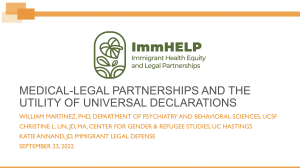 Medical-Legal Partnerships and the Utility of Universal Declarations
Medical-Legal Partnerships and the Utility of Universal Declarations
Katie Annand, Immigrant Legal Defense; Christine Lin, Director of Training & Technical Assistance, Center for Gender & Refugee Studies, UC Hastings; and William Martinez, Assistant Professor, Psychiatry and Behavioral Sciences, University of California, San Francisco
Immigrant youth may have profound histories of exposure to trauma and adversity that result in complex needs for medical, behavioral health, and legal services upon reception in the United States (McCabe & Kinney, 2010). These needs frequently go unmet, resulting in long-term consequences that constitute social determinants of health. A response to the complex needs of immigrant youth requires multidisciplinary collaboration. Medical-legal partnerships (MLPs) offer one model for multidisciplinary collaboration for eliminating health disparities through addressing the social determinants of health.
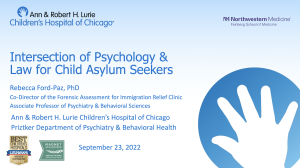 Intersection of Psychology & Law for Child Asylum Seekers
Intersection of Psychology & Law for Child Asylum Seekers
Rebecca Ford-Paz, Clinical Child Psychologist, Ann & Robert H. Lurie Children’s Hospital of Chicago Associate Professor of Psychiatry & Behavioral Sciences, Northwestern Feinberg School of Medicine
In contrast to the abundant literature available to guide the conduct of psychological asylum evaluations for adults, the literature on forensic evaluation of asylum-seeking minors is much sparser. The present mixed method exploratory pilot study aims to inform guidelines for pediatric providers conducting pediatric psychological asylum evaluations and document the stories and humanize children forced to flee their countries of origin.
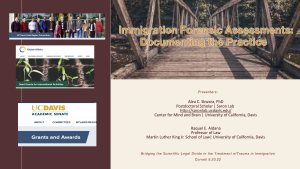 What Constitutes “Credibility”? Documenting Current Practices and Perceptions in Immigration Forensic Assessments
What Constitutes “Credibility”? Documenting Current Practices and Perceptions in Immigration Forensic Assessments
Raquel Aldana, Martin Luther King Professor of Law, UC Davis and Alea Skwara, Postdoctoral Scholar, University of California, Davis
The establishment of credibility is a key factor in the adjudication of asylum cases. However, legal and scientific understanding of what constitutes a credible story greatly diverge. This is particularly pronounced in cases where trauma, brain injury, or other mental health factors may influence an asylum seeker’s ability to tell their story. The forensic evaluation represents an existing leverage point in the legal process where psychologists and attorneys can collaborate and co-educate to increase an immigration petitioner’s chances of a successful claim.
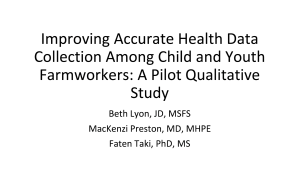 Improving Accurate Health Data Collection Among Child and Youth Farmworkers: A Pilot Qualitative Study
Improving Accurate Health Data Collection Among Child and Youth Farmworkers: A Pilot Qualitative Study
Beth Lyon, Clinical Professor of Law, Associate Dean for Experiential Learning, Clinical Program Director, Director, Farmworker Legal Assistance Clinic, Cornell Law School; MacKenzi Preston, MD, MHPE, Assistant Professor of Pediatrics, Department of Pediatrics, Weill Cornell Medicine; Faten Taki, PhD, MS, Instructor of Pharmacology in Anesthesiology, Anesthesiology Global Health Initiative, Department of Anesthesiology, Weill Cornell Medicine
Millions of children are directly affected by conflict and human rights violations around the world and are forced to leave their homes. Many of these children are unaccompanied by parents, are extremely vulnerable and may suffer from various health conditions with limited access to primary care. Anecdotal evidence suggests that many of these children migrate to rural areas in countries of employment, working in agricultural sectors where they may be exposed to occupational hazards or human trafficking.
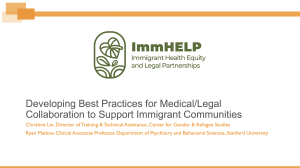 Developing Best Practices for Medical/Legal Collaboration to Support Immigrant Communities
Developing Best Practices for Medical/Legal Collaboration to Support Immigrant Communities
Christine Lin, Director of Training & Technical Assistance, Center for Gender & Refugee Studies, UC Hastings; J. Raul Gutierrez, Clinical Professor, Pediatrics, University of California San Francisco; Ryan Matlow, Clinical Associate Professor, Stanford School of Medicine Department of Psychiatry and Behavioral Sciences
Formed in 2018, the Immigrant Health Equity and Legal Partnerships (ImmHELP) is a coalition of legal services and healthcare providers dedicated to supporting the safety, stability, and health of individuals in immigration proceedings. Following ImmHELP efforts to promote system change across health and legal sectors, the current workshop will focus on advancing best practices for interdisciplinary collaboration and system of care development to empower immigrant communities.
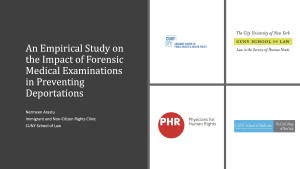 Access to a Doctor, Access to Justice? An Empirical Study on the Impact of Forensic Medical Examinations in Preventing Deportations
Access to a Doctor, Access to Justice? An Empirical Study on the Impact of Forensic Medical Examinations in Preventing Deportations
Nermeen Arastu, Associate Professor, CUNY School of Law
The empirical study discussed in this Article—the largest-of-its-kind quantitative study of over 2,500 cases in which Physicians for Human Rights (“PHR”) facilitated medical evaluations on behalf of immigrants—found that 81.6% of individuals who received a forensic medical evaluation between 2008 and 2018 experienced some form of a positive immigration outcome. In comparison, immigration adjudicators only granted relief to asylum seekers an estimated 42.4% of the time overall during this same period.
Sexual Orientation Asylum Petitions: Challenges in Forensic Psychosocial Immigration Evaluations
Mark Silver, Forensics and Mitigation
Asylum applications based on sexual orientation have risen in the United States and Canada in past decades. Mark Silver addresses the challenges of litigating an asylum petition based on sexual orientation and offers insight as a clinical expert who evaluates claims of persecution and harm.
